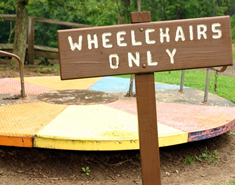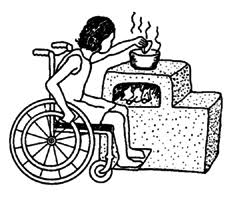
When I was in kindergarten at St Francis School in Ridgefield Park NJ, there was a little girl in my class who was slower than the rest of us to learn everything. The teacher, an older woman about to retire, became very upset with her.
We had a sliding pond in our classroom. Every day before snack time, the teacher allowed those of us who had been good to slide down as a reward.
Every day, this little girl was not allowed to go down the slide. Instead, she was sent to the corner because she broke one rule or another. “When are you going to learn?” the teacher would ask her as she took her out of line. “When you learn, you ‘ll be allowed to slide down with the rest of the class.”
One day this all became too much for me to watch. I made sure I was behind the little girl in line. When the teacher grabbed her shoulders and began to push her toward the corner, I waved at the little girl, who looked at me with a puzzled expression. I told the teacher “I want to give my turn to her” and pointed at the little girl in the corner.
“You can’t do that,” the teacher said. “Don’t be silly. Take your slide down.”
“It’s my turn and I want to give it to her,” I insisted. I motioned for the little girl to come over to the sliding pond. Hesitating, she walked over toward me.
The teacher said nothing as the little girl climbed up the steps. Then she pushed down the sliding pond, giggling loudly, with an expression of joy on her face. I ran around the front to catch her as she came down. We both were knocked to the ground, laughing.
“Thank you,” the little girl said to me . “ I don’t care if I only go down the sliding pond once – now I know how it feels to be like everyone else!”
The teacher overheard us. She never put that little girl in the corner again at sliding pond time . She took her turn like everyone else in the class, even though she continued to struggle with following the rules.
I never imagined that one day I would become a quadriplegic and face a battle with inclusion myself. It just wasn’t in my life plan.
And yet , why not? Why didn’t it ever occur to me that I could be that little girl with cognitive limitations or grow up to become disabled?
Because even though I considered myself to be open minded on the subject of disability, I too suffered from the illusion that there is an “us-them” dichotomy. Those of us in the first category aren’t disabled like them – and we don’t ever think or foresee that it might happen to us.
I realize now that this distorted thinking is no coincidence. It sprouts from our belief that those with disabilities just are that way because of some reason. Those of us who are not disabled just weren’t “them”. “They” were an other, a different entity.
There were those of us who were allowed to slide down the slding pond because we could understand the rules and then there were those , i.e. them, who were not. At a very young age, I learned one thing – people would not stand up for or say anything about the unfairness of the situation, even though it was unreasonable to expect someone who could not understand the rules to follow the rules. It was like punishing someone who spoke only English for not understanding an instruction given in Japanese.
I didn’t understand until I became a quadriplegic, however, how ingrained our socialization is between those who are disabled and those who are not. It was then that the sense of a class distinction – being treated like a second class citizen – was thrust into my face. At that point, I learned that being disabled wasn’t just hard because I would lose my turn on a sliding pond.
It was hard because I had to struggle just to be included. Gone was the level playing field. I was different, I was physically limited – I was one of “them”.
I realize now that I had no real understanding of what that little girl in my class went through. I gave her my turn on the sliding pond, but I was not able to protect her from the taunts and teasing of our classmates. Over the next few years that we attended the same school, I saw her being excluded from activities that I enjoyed, from classes that I took and from social events that others had.
Each time she was excluded, it became more difficult for her to fit in or catch up with the rest of us. By the time I left that school at the end of 2nd grade, that little girl had been left back and was no longer in my class. It was like a race where she kept running faster and falling further behind.
Although I became disabled in my thirties, well into my own adulthood, the lack of inclusion in our society has impacted my life. The lack of a level playing field, the level of ignorance , the failure to accommodate the simplest physical needs – these combine to make some days very difficult. The Darwinian attitude that the strongest should succeed and other outdated beliefs continue to haunt those of us who deal with mental and physical challenges.
It is ludicrous to debate whether I am different than most people. Of course I am! I’m a quadriplegic. But , then again, paradoxically, I am the same as you. We can form subgroups according to gender or age and take out the variable of being disabled and squeeze me back into a homogenous group . I can be included statistically and I can fit myself into most situations if I try hard enough.
Yet inclusion is about belonging despite my differences. It Is about being able to participate. Spiritual inclusion goes even further. It means to be seen as an equal , as another child of God with the same self worth as anyone else. It is about maximizing the talents given to me in the spiritual service of my Savior and God in an atmosphere that is supportive and respectful about my physical limitations. It is about the freedom to celebrate who I am and realize my own sense of dignity.

















































